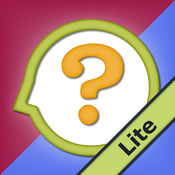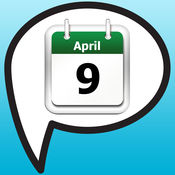-
Category Medical
-
Size 32.8 MB
The FREE version of Talk Around It Home helps people with word finding difficulties to practise Naming Techniques & improve Word Retrieval. Developed by Speech & Language Therapists, Talk Around It uses evidence-based techniques to treat conditions such as aphasia, anomia, stroke, dementia, alzheimers and autism. (Eimear, SLT, Ireland)Talk Around It apps are available in British English, American English Spanish, Hindi and Brazilian Portuguese.
Talk Around It Home FREE-Speech & Language Therapy alternatives
SmallTalk Conversational Phrases
Designed for people with aphasia, an impairment in the ability to use language, SmallTalk Conversational Phrases provides a vocabulary of pictures that talk in a natural human voice. SmallTalk Conversational Phrases contains words and phrases commonly used in conversations, such as greetings, responses, requests, and statements about well-being. SmallTalk Letters, Numbers, Colors: Speech-exercise videos for the alphabet, numbers 120, and primary colors.
-
size 27.9 MB
Question Therapy Lite: 2-in-1 Asking & Answering for Yes/No & Wh Questions
Two amazing apps in one Try Question Therapy for free Question Therapy Lite combines Answering Therapy Lite & Asking Therapy Lite in a free trial of the amazing new therapy program: Question Therapy 2-in-1.Question Therapy is the answer - Teachers with Apps 4.5 Stars A Must Have for SLPs - Smart Apps for Kids Brilliant - The Appy Ladies App 1) ANSWERING THERAPY LITE- yes/no & wh-questions- personal orientation questions- custom questions (limited in Lite version)Understanding & answering question is a common goal for both children with special needs & adults with acquired communication impairments (aphasia, brain injury). No other app available works on both Yes/No & Wh- questions (8 different types ), nor will you find one that lets you add personalized questions With a simple personal survey, this app will work on personal orientation questions automatically, verifying knowledge of the users personal data along with the current date & time Use with a loved one at home or with clients in a therapy setting with equal ease. Finally theres a tool to practice ASKING questions Learn how asking questions will get you certain types of answers; ask properly-formed yes/no questions in 8 different verb tenses; ask for clarification using Wh questions (who, what, where, when, why); spin the wheels to ask questions of every type Both apps feature:*user profiles (up to 4 in Lite version, unlimited in paid app)*automated data tracking & storage*built-in hints*emailed progress notes*audio for every question & answer for non-readers*intuitive user interface*so many settings for customization*high-quality automated & recorded voices*motivating answers & performance markers*age-free design is clean, distraction-free & respectful*a sample of the 900+ stimuli in the full versionQuestion Therapy will amaze you with how much language it elicits as users repeat, guess answers, try each option & gain confidence in conversation Try these evidence-based apps for yourself with the free Lite version, then give your clients or family members the full tools they need to succeed NO in-app purchases, NO personal data collection, NO ads for outside products & links can be deactivated.
-
size 41.6 MB
SmallTalk Dysphagia
Designed for people with dysphagia, an impairment of the ability to swallow, SmallTalk Dysphagia provides a vocabulary of pictures and icons that talk in a natural human voice. SmallTalk Dysphagia contains 50 phrases that cover eating equipment, meal assistance, diet, liquids, medications, and compensatory treatment techniques. SmallTalk Letters, Numbers, Colors: Speech-exercise videos for the alphabet, numbers 120, and primary colors.
-
size 45.2 MB
SmallTalk Days, Months, Dates
The SmallTalk Days, Months, Dates app provides a series of speech-exercise videos, each illustrating the tongue and lip movements necessary to produce the days of the week, months of the year, and ordinal numbers 1st through 31st. These articulation videos allow people with apraxia, aphasia, and/or dysarthria resulting from stroke or head injury to easily practice time-related phrases as often as they like. Lois Jean Brady, Speech-Language Pathologist (US)
-
size 41.7 MB
SmallTalk Daily Activities
Designed for people with aphasia, an impairment in the ability to use language, SmallTalk Daily Activities provides a vocabulary of pictures that talk in a natural human voice. SmallTalk Daily Activities contains words and phrases related to the Activities of Daily Living, such as bathing, dressing, grooming, and leisure. SmallTalk Letters, Numbers, Colors: Speech-exercise videos for the alphabet, numbers 120, and primary colors.
-
rating 2.66667
-
size 41.5 MB




